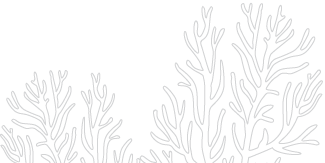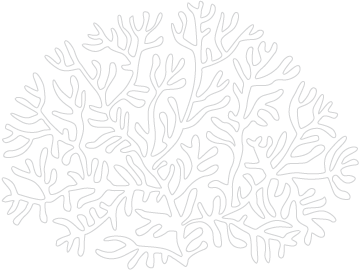At the moment, there are no entries available for display
The dynamic evolution of our operational framework builds a robust production capability, ensuring we deliver superior and sustainable textile solutions.

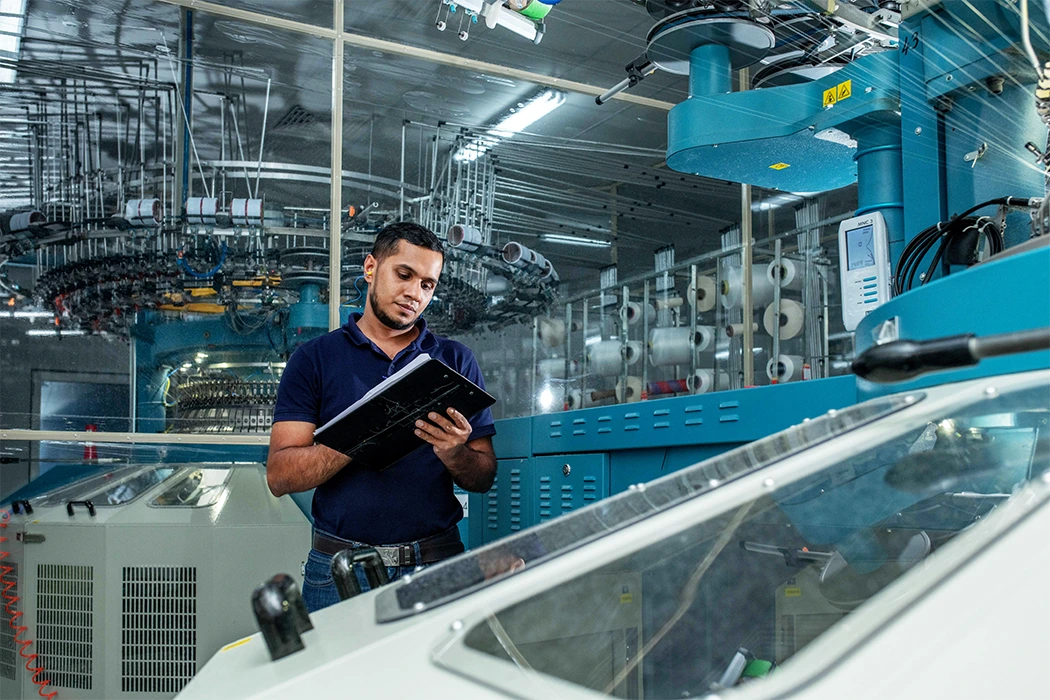
Manufacturing excellence is central to Teejay’s strategic approach: driving operational efficiency across all facilities, keeping pace with technological advancements, fostering opportunity through partnerships and collaboration, and achieving sustainability through innovation. Through continuous improvement, strategic investments in infrastructure, technology, we empower our employees and strengthen manufacturing operations. Ultimately, this generates exceptional value for our customers in our industry, builds trust with our stakeholders, and lays the foundation for the long-term success of our business.

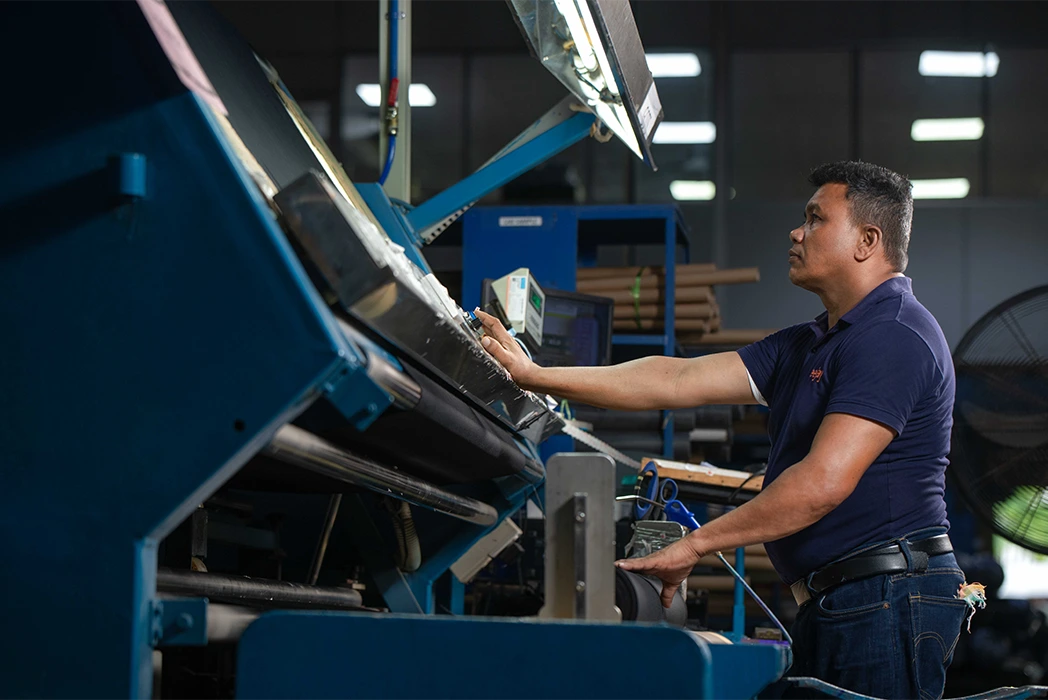
Meeting our sustainability targets in manufacturing necessitates, decarbonising our operations and embracing the energy transition. Our strategies and performance in this area are detailed in the Environmental Stewardship Impact section on page Environment Stewardship.
Our industry-leading product and raw material innovations, key aspects of achieving manufacturing excellence, are described in the Innovation in Fabrics section on page Customer Centricity At Our Core. The Manufacturing Excellence section on page Manufacturing Excellence further discusses our efforts to align manufacturing and production processes with the evolving needs of customers and consumers within the industry.
Overview of Our Facilities
| Facility | Production Capabilities | Daily Capacity | Other Details |
| Teejay Lanka | Weft knitting: cotton and cellulosic blends
Manmade cellulosic modal Synthetics: nylon and polyester Jacquards |
45 Tons | Listed on the Colombo Stock Exchange |
| Teejay Prints | Printing: discharge, pigment super soft, reactive, digital, disperse | 20,000 metres | Wholly-owned subsidiary of Teejay Lanka PLC |
| Teejay India | Weft knitting: cotton and cellulosic blends Synthetics: nylon and polyester Fleece, lace and discharge Pigment super soft Reactive |
55 Tons | Located in Adhistan Integrated Industrial Park, Visakhapatnam (Andhra Pradesh, India) |
| Nubian Threads | Weft Knitting: Cotton & cellulosic blends Man made Cellulosic modal Synthetic: nylon & polyester | 1-3 Tons | Subsidiary of Teejay Mauritius |

40 Tons

15 Tons



38 Tons

7 Tons
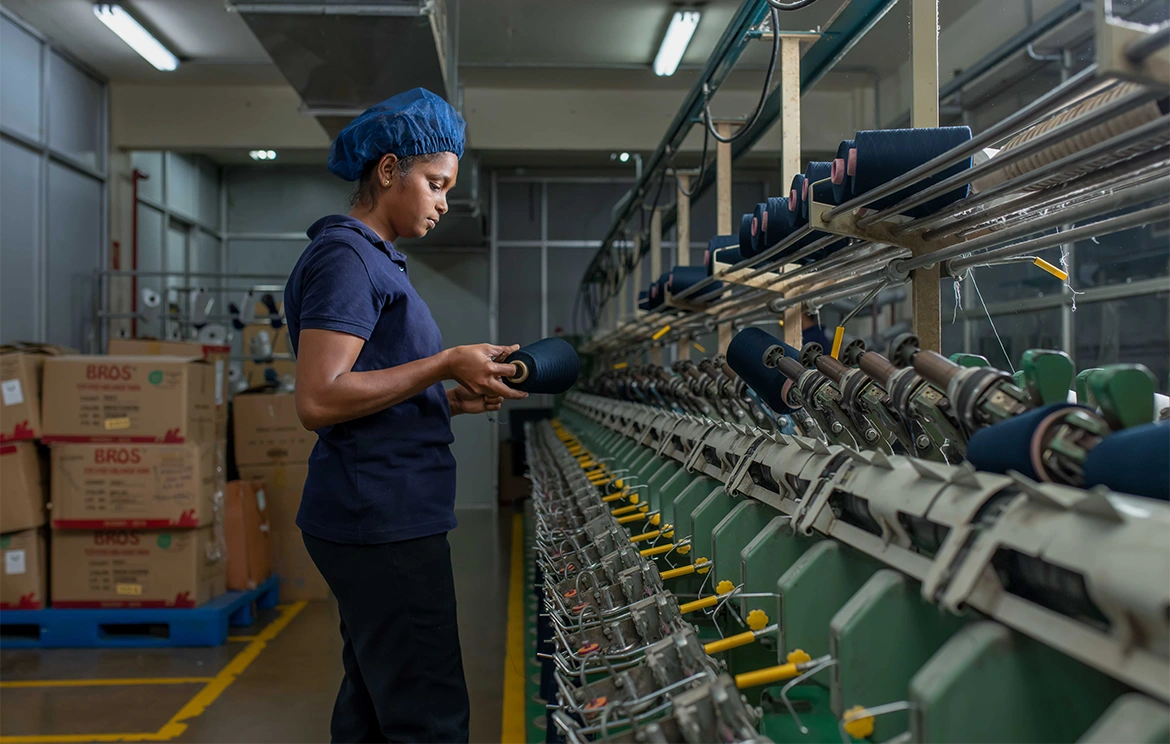
Driving Manufacturing Excellence
To achieve optimal efficiency and maximise value throughout our production, Teejay has embraced Lean Manufacturing principles. The Teejay Operating System (TOS) and Quality Management System (QMS) provide the framework for integrating and implementing lean practices; techniques such as just-in-time inventory management, value stream mapping, 5S workplace organisation, and Kaizen.
Lean Manufacturing at Teejay drives faster production volumes by reducing waste, optimising workflows, and minimising bottlenecks, resulting in significant benefits: lower costs, higher productivity, improved quality, greater customer satisfaction, and an empowered, innovative workforce committed to continuous learning and improvement.
As part of our continuous journey toward operational excellence and digital innovation, we are pleased to report that all our knitting machines are now fully integrated with the smart knitting network monitoring system, developed in collaboration with Xdoto. This strategic initiative represents a significant leap in our adoption of Industry 4.0 technologies, enabling us to transform traditional processes into intelligent, connected operations.
Through this implementation, each machine now transmits real-time data via Wi-Fi, providing comprehensive visibility into key operational parameters including machine utilisation, yarn and elastane breakages, stoppage causes, and production quality indicators. The system is supported by advanced dashboards, device history tracking, and automated reporting, allowing our teams to monitor performance and take prompt, informed action.
The impact has been highly encouraging:
Machine utilisation has risen from 58% to 73%, marking a substantial improvement in operational efficiency.
Average daily production has increased from 30,000 kg to 35,000 kg, directly contributing to our throughput and delivery capabilities.
The ability to monitor frequent breakages in real-time has improved product quality and reduced production disruptions.
Furthermore, integration with business-level ERP systems ensures that OEE (Overall Equipment Effectiveness) and key performance indicators (KPIs) are tracked automatically, enabling data-driven decision-making and greater accountability across operations.
This complete coverage of our knitting fleet with Xdoto’s smart solution not only strengthens our production capabilities but also reinforces our commitment to digital transformation, sustainability, and continuous improvement. We will continue to invest in intelligent solutions that align with our long-term vision of building a future-ready, responsive, and efficient manufacturing platform.
Leveraging Collaboration and Digital Transformation
Strategic collaborations and partnerships with technology leaders, innovators, and other key players in the fabric and apparel industry are essential to Teejay's pursuit of manufacturing excellence. We prioritise working with partners who bring complementary skills and technologies, enabling the integration of new advancements into our manufacturing processes and ensuring we remain competitive in a rapidly evolving industry.
This includes:
- Technology expansion: Forming partnerships with global industry experts to drive technological advancements.
- Expanding global network: Strategically pursuing opportunities to establish a presence closer to needle point hubs.
Teejay’s Group-wide ERP system provides a centralised digital platform for managing customer orders from development to production, significantly improving traceability and resulting in substantial efficiency gains for both our teams and our customers.
New Developments in 2024/25
Teejay has several key initiatives in the pipeline to improve our technological advantage, expand production capabilities, and align with global trends in textile innovation.
- Invested on Jacuqard machinery
Infrastructure Investments
Digital transformation and technological improvements have revolutionised our production and resource management processes, becoming a key part of our annual manufacturing investments. During the reporting year Teejay has invested in new knitting, finishing and dyeing machines
Improved Fabric Quality and Efficiency:
- Improved Surface Quality: Sanding machines were introduced for improved fabric surface quality, minimising defects.
- Precision Finishing: We invested in shearing machines to streamline finishing, ensuring precision and improving the overall quality of knitted fabrics, while minimising reprocessing.
- Superior Finishing: The introduction of calendaring equipment adds gloss and smoothness for a more appealing fabric finish and better resource use.
- Higher Quality Raw Materials: Fibre washing tanks were introduced to remove impurities, leading to improved fabric quality and less manufacturing waste.
- Sustainable Shrinkage Control: A steam-based continuous tumble dryer was added to our production line to provide precise fabric shrinkage control. Operating without additional water resources, it contributes to a more sustainable production cycle.
Enhanced Fleece Production:
- Expanding the fleece knitting capacity: to optimise the market demand
- Increased Brushing Capacity: Installation of advanced brushing machines has increased our capacity to 900,000 metres per month, supported by additional fleece attachments and cylinders.
Greater Automation and Turnaround:
- Intricate Design Capability: Automated jacquard machines were installed to increase efficiency in production of intricate designs, reducing manual intervention.
- Greater Efficiency at Final Production Stages: New finishing and detaching machines were brought in to accelerate turnaround times for items like collars and cuffs.
Adoption of automation allows employees to concentrate on more value-added tasks, resulting in a measurable increase in output per worker and reduced operational delays. Improvements in fabric processing also ensure a more efficient use of our raw materials, leading to cost savings.
At Teejay, all investment proposals undergo thorough evaluation by a cross-functional team. This analysis incorporates demand planning insights and aligns with the Group’s Long-Range Plan (LRP), focusing on long-term benefits and future-readiness. Additionally, we strategically allocate brands across facilities based on geographical advantages and technical capabilities, thereby optimising production for each customer.
Operational Efficiency
A key strategic imperative for enhancing operational efficiency at Teejay is the continuous improvement of our systems and processes, alongside an ongoing drive to modernise our manufacturing operations. This involves several key initiatives:
- Enhanced Shop-floor Automation: Internet of Things (IoT) devices have been installed across all knitting plant machines and utility points. This enables real-time data capture and performance tracking, allowing our engineering and production departments to optimise processes, minimise downtime, reduce costs, and improve overall efficiency.
- Data-Driven Insights: Microsoft Power BI and SAP Fiori are utilised to convert raw data into actionable insights. During 2024/25, SAP underwent upgrades, including tighter system controls, seamless integration with external platforms (such as vendor systems), and the deployment of SAP Fiori dashboards, many of which are now accessible on mobile devices for improved flexibility and real-time decision-making.
- Advanced Quality Control and Waste Management: Automated quality control systems, coupled with Artificial Intelligence (AI)-powered waste management solutions, enable early defect detection to reduce material waste and improve recycling efficiency.
- Automation of Routine Tasks: Utilisation of Robotic Process Automation (RPA) and Microsoft Power Automate provide greater control over our operations and production processes.
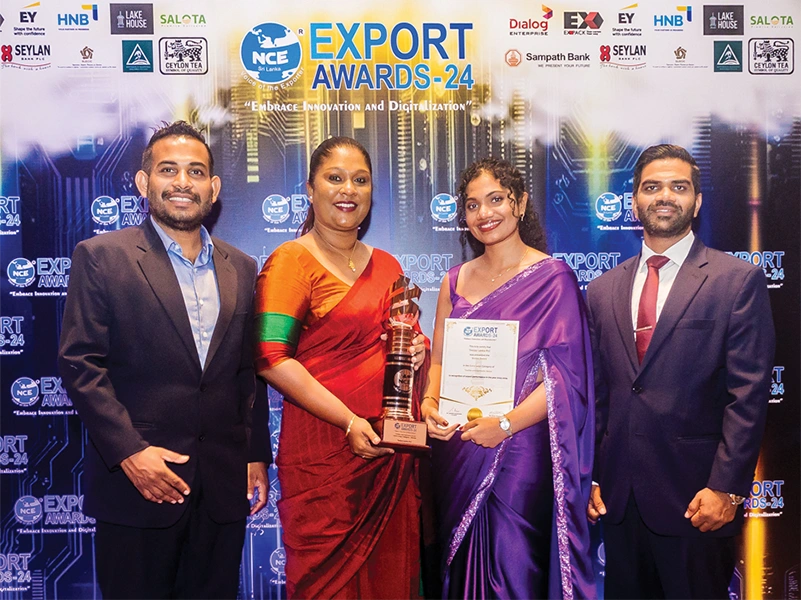
NCE Export Awards – Bronze Award in Extra Large Category of Textiles and Garments Sector
Optimising Production:
Virtual Continuous Flow (VCF)
Launched in November 2024, the Virtual Continuous Flow (VCF) initiative aims to optimise Work-In-Progress (WIP) management by maintaining a Days Cycle Time (DCT) of 4-5 days. This is achieved through daily updates, visual management, and prompt corrective actions to ensure smooth production operations.
Initial Planning Phase: Our focus was on optimising synthetic fabric processing. Early assessments led to strategic adjustments, notably aligning preparation machines with dyeing machines for a smoother workflow. Currently, three strategically selected preparation machines operate in sync with dye machines to maximise output.
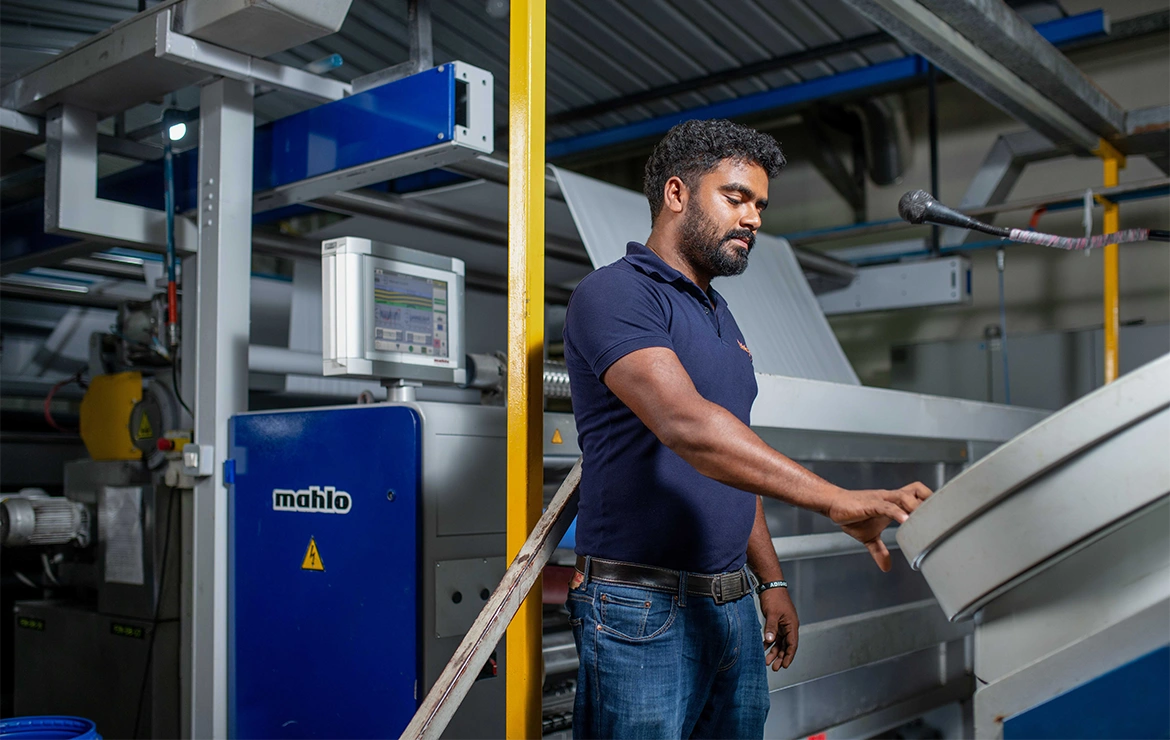
The FastReact System
The FastReact system marks a significant transformation in our planning processes, transitioning from manual based calculation to an integrated, real-time digital platform. This upgrade enhances visibility across capacity, raw materials, and resource planning, enabling more accurate decision-making and operational efficiency.
By ensuring 100% accuracy in capacity allocation and aligning raw material availability with customer commitments, the tool supports over 98% accuracy in delivery timelines. Integrated with SAP HANA, FastReact creates a streamlined and responsive manufacturing environment, reinforcing Teejay’s pursuit of operational excellence through strategic investments in manufacturing capital.
Structured WIP Control Mechanisms:
- Set Goals: Clearly defining WIP targets to maintain efficiency.
- Control WIP: Implementing structured monitoring and interventions to prevent bottlenecks.
- Visual Management: Labelling each WIP stage, tracking abnormalities, and ensuring visibility for quick action.
- Tracking: Utilising photos and a WIP tracking sheet to monitor progress at each stage.
- Review: Conducting regular meetings to assess WIP trends, identify bottlenecks, and implement corrective actions.
- Monitor: Continuously tracking DCT reductions to ensure efficiency gains.
- Share Results: Communicating process improvements and adjusting strategies accordingly.
Parallel Implementation: Implementing this strategy in the non-synthetic processing lane has also yielded significant results, a reduction in Turnover days from 10.6 to 6.8 days, with no drop in quality.
Next Steps: Building on our initial success, the next milestone is to achieve a TOD target of 5 days. Continuous improvement efforts, enhanced data tracking, and real-time process adjustments will be key enablers in achieving this ambitious goal.
Our Manufacturing Targets for 2025/26
- Deliver ongoing business-driven system enhancements and change requests.
- Migrate to the latest SAP version for platform stability and scalability.
- Further enhance SAP Fiori applications to improve user experience and functionality.
- Expand IoT implementation and integrate suitable AI solutions to meet operational needs.
- Complete IoT rollout for Teejay India.
- Deploy SAP to our expanded locations.
- Extend RPA solutions across all functions and scale implementations to other group entities.


